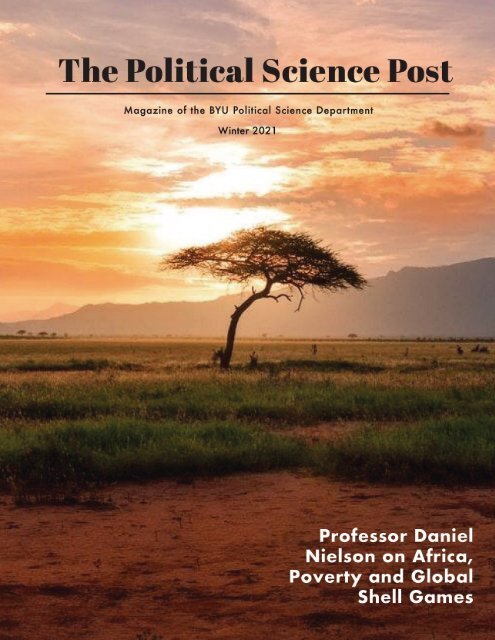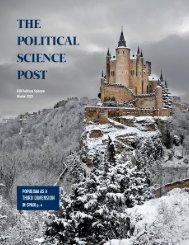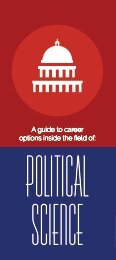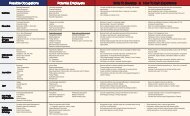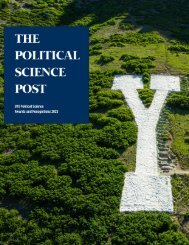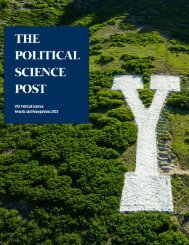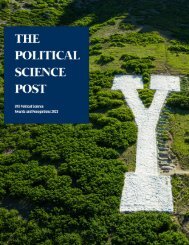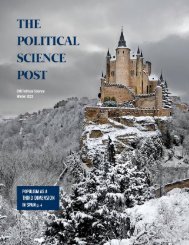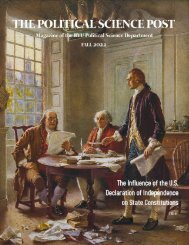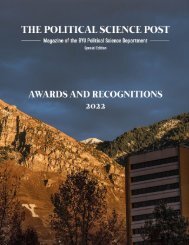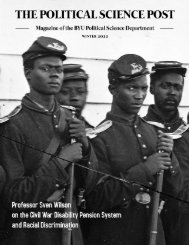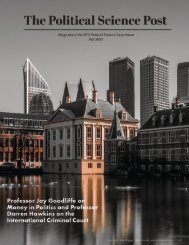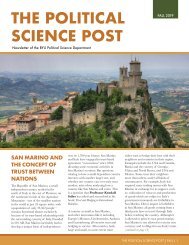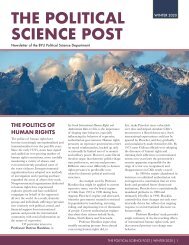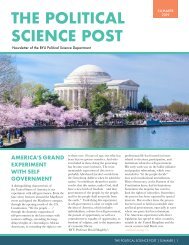Create successful ePaper yourself
Turn your PDF publications into a flip-book with our unique Google optimized e-Paper software.
1
1THE SYAHIM MAG<br />
2
The year 2020 was exhausting,<br />
with a global pandemic, a divisive U.S.<br />
presidential election, and race riots<br />
across the country. But as a result, many<br />
rediscovered the beauty of simple things<br />
like the outdoors, hiking, biking and smaller<br />
things at home, and also of gratitude,<br />
giving thanks and of lightening a troubled<br />
world. The BYU Department of <strong>Political</strong><br />
<strong>Science</strong> also issued an important statement<br />
on race after the tragic loss of an African<br />
American citizen—George Floyd—<br />
resulted in a national outcry. In this issue,<br />
we reiterate the Poli Sci statement on race,<br />
and discuss the scholarship of Professor<br />
Dan Nielson, especially on Africa and on<br />
poverty. We hope that <strong>2021</strong> will be a better<br />
year with positive change.<br />
FOREWORD<br />
WINTER <strong>2021</strong><br />
The <strong>Political</strong> <strong>Science</strong> Department<br />
Publisher:<br />
Sven Wilson, Chair<br />
Editor:<br />
J. Matthew Clarke<br />
Graphic Designer:<br />
Sydney Freeman<br />
3<br />
1
THE SYAHIM MAG<br />
CONTENTS<br />
WINTER <strong>2021</strong><br />
FOREWORD 1<br />
AFRICA, POVERTY, AND GLOBAL SHELL<br />
GAMES 3<br />
EVENTS AND PROGRAMS 4<br />
STATEMENT REGARDING RACE AND<br />
INCLUSION 6<br />
POLITICAL SCIENCE SPEAKERS 8<br />
POLITICAL PHILOSOPHER 10<br />
ALUMNI SPOTLIGHTS 12<br />
STUDENT SPOTLIGHTS 13<br />
FACULTY IN THE NEWS 14<br />
FACULTY SPOTLIGHT 19<br />
BYU POLITICAL SCIENCE FACULTY<br />
AWARDS 2020 22<br />
FACULTY PUBLICATIONS 23<br />
FACULTY QUOTE 24<br />
4<br />
2<br />
The BYU Department of <strong>Political</strong> <strong>Science</strong>, consistent with the aims of a<br />
BYU education, intends to foster “Lifelong Learning and Service.”<br />
We hope to provide our alumni with intelligent, thoughtful and<br />
sophisticated analysis of important issues, and to act as a catalyst for<br />
service in our communities, neighborhoods, nations and the world.
Professor Daniel Nielson on Africa, Poverty, and<br />
Global Shell Games<br />
In December 2009, Thai special-forces seized a cargo plane at Bangkok Airport. The manifest<br />
claimed the airplane carried drilling equipment intended for oil exploration. Instead, 35 tons of<br />
weapons crammed the hold – arms that included rocket launchers and anti-aircraft missiles. The<br />
weapons originated in North Korea and were bound for Iran, mocking the United Nations arms<br />
embargo that targeted two of the three “Axes of Evil”. This is how the book “Global Shell Games:<br />
Experiments in Transnational Relations, Crime and Terrorism,” by BYU <strong>Political</strong> <strong>Science</strong> Professor<br />
Daniel L. Nielson and his colleagues, Michael G. Findley and J. C. Sharman, begins.<br />
Law enforcement officials traced the arms shipment to an obscure Chinese national, Lu Zhang,<br />
who was a recent immigrant to New Zealand. The 28-year-old woman served as the sole director of<br />
SP Trading, the company that hired the plane and apparently engineered this arms trade. In fact, Lu<br />
directed scores of other companies.<br />
But, apparently, Lu Zhang had no idea that she was a notorious arms trader and international<br />
financial criminal until officials contacted her. Rather, she had worked as a short-order cook at a Burger<br />
King in Auckland. Representative of the GT Group, a shady incorporation service specializing in<br />
setting up companies for others, had hired Lu as a patsy. To supplement her income, for fifteen dollars<br />
each time she signed the documents they placed in front of her. The genius of this scheme meant that<br />
any corporations set up by the GT Group could not be traced beyond Lu Zhang.<br />
Shell Companies are significant, as this example illustrates, because they cannot be traced back<br />
to their real owners, and are widely held to be one of the most common means for laundering money,<br />
giving and receiving bribes, busting sanctions, evading taxes, and financing terrorism. For example, a<br />
tiny home in Cheyenne, Wyoming houses more than 2,000 shell companies that could be used for both<br />
legitimate and illegitimate purposes. This book attempts to look through the “corporate veil” and goes<br />
a long way to remedying a fundamental, pervasive problem with worldwide corporate entity law. Dan<br />
Nielson and his colleagues sent out more than 7,400 email solicitations to nearly 3,800 corporate service<br />
providers (CSPs) that make and sell shell companies in 181 countries. They wanted to test whether<br />
international rules are actually effective in mandating identity documents from their customers. This<br />
study also hopes to provoke governments to greater efforts in enforcing corporate transparency.<br />
Thank you, Professor Nielson, for a fascinating, relevant, timely read.<br />
(Continued on page 20)<br />
5<br />
3
THE SYAHIM MAG<br />
Durham Lecture 2020: Neylan McBaine<br />
CEO Better Days 2020<br />
February 13, 2020, 250 KMBL, 11am<br />
Utah Women Led the Nation in the 1870’s and beyond, as they were the first to vote under the new<br />
suffrage laws that were emerging in the late 1800s and early 1900s. This became a whole movement of<br />
Utah women to help lead the nation. As we recognize our distinguished history, we need to put out a<br />
different narrative to the national media about Women in Utah.<br />
The year 2020 was the 150th anniversary of Utah women’s first votes: on February 12, 1870, a Utah<br />
Act gave Utah women the right to vote. On February 14, 1870, Seraph Young went to the polls and<br />
cast the first vote by a women in the nation—the first ballot cast under a suffrage law, in Salt Lake<br />
City’s municipal election. Other states had limited targeted voting for a few land owning women, but<br />
not generally. The suffrage movement had been fomenting for decades. The year 2020 was also the<br />
100th anniversary of the ratification of the 19th Amendment to the U.S. constitution, on August 18.<br />
1920, granting Women’s Suffrage<br />
No one understood what was happening in Utah in the 1870s, a state that was trying to become part<br />
of the Union. The New York Times suggested that Utah women should vote, and that the Mormons<br />
would suffer because Utah women would vote against the state and polygamy. That didn’t happen. The<br />
original reason for enfranchising women in Utah was hoping they would vote against the state. But the<br />
Utah women did not cooperate, and did not vote out polygamous leaders. They started forming protest<br />
groups across the state: “Indignation meetings,” which involved 30% of the territorial population in<br />
support of polygamy and the right to practice their religion. The Eastern Media hated polygamy.<br />
Eastern newspapers published lots of cartoons, and debated a lot of laws to criminalize polygamy. In<br />
1887, the Edmonds Tucker Act disenfranchised anyone who was polygamous. Soon, the Relief Society<br />
started calling themselves suffrage organizations.<br />
6<br />
4<br />
Susan B. Anthony, the prominent American social reformer and women’s rights activist, came to Utah<br />
on multiple occasions to help Utah women in the late 1800s.
Susan despised marriage, but she championed the Utah suffragist movement. LDS women Emma B.<br />
Wells, Sarah Kimball, Dina Young, and Martha Hughes Cannon, were Utah leaders and they worked<br />
together with prominent national leaders.<br />
Emmaline B. Wells, Neylan’s hero, edited the Woman’s Exponent, a semi-official publication of the<br />
Church of Jesus Christ of Latter-day Saints that began in 1872, and expanded its mission much<br />
farther beyond Church membership. She wrote thousands of editorials. She traveled to London and<br />
the target audience became women all over the world.<br />
In 1896 when Utah was granted statehood, 107 men came together to approve a new constitution<br />
for the new state, and men granted women the right to vote again in the state constitution. After the<br />
new Utah constitution was established, Utah women went to Washington, DC to testify that women<br />
would not abandon family, husbands, and children when they got the right to vote. Women mobilized<br />
to get men on their side, and in 1896 the state of Utah achieved Utah Constitution Article 4, Section 1<br />
which grants women the right to vote in Utah. We are still living under that statute.<br />
In 1896, Dr. Martha Hughes Cannon ran as the first Female State Senator, running against her<br />
husband. She won. She was the fourth wife of Angus Cannon. But, in 1899, she had to go into exile<br />
after she got pregnant. If you were a polygamous wife in 1899, you were disenfranchised and she went<br />
to Wales to hide out for a while. Children of polygamous marriages were declared bastards at the<br />
time. Chaos reigned for a period in the late 1800s. Martha Hughes Cannon’s statue is in the National<br />
Capitol now.<br />
DURHAM LECTURE WITH<br />
NEYLAN MCBRIDE<br />
EVENTS AND<br />
PROGRAMS<br />
On the 80th birthday of Susan B. Anthony, in 1900,<br />
Emma Wells gave Susan a bolt of black silk that<br />
became a dress and is now in her museum home in<br />
Rochester, New York.<br />
In 1920, Emmaline Wells, 96 years old, lived to see the<br />
19th amendment, which prohibited U.S. governments<br />
from denying the right to vote on the basis of sex,<br />
ratified on August 18, 1920. She was also the Relief<br />
Society president at the time. Susan B. Anthony had<br />
already died. In 1870, Emma Wells was the sixth<br />
wife of Daniel Wells, Salt Lake City mayor, and she<br />
probably voted in the 1870 vote, but we do not know.<br />
It was remarkable that she was alive to see the 19th<br />
amendment pass in 1920.<br />
As a Utah suffragist, Emmeline B. Wells met four U.S.<br />
Presidents. In 1919, President Woodrow Wilson got<br />
off the train in Salt Lake City and went to Hotel Utah,<br />
and met with 95 year old Emmeline Wells; she was the<br />
most famous woman in Utah and famous all over the<br />
country.<br />
Seraph Young, photo published in the Deseret Evening News March 1902<br />
The history of women and politics in Utah is very rich and we should be proud of it. A cartoon from<br />
1915 illustrates the power of the women in Western States, especial in Utah, to influence the eastern<br />
establishment.<br />
Thank you Neylan McBaine for your enlightening presentation and for your continued work for<br />
women in Utah and in the nation and world.<br />
7<br />
5
MY SOUND<br />
14<br />
8
STATEMENT<br />
REGARDING RACE<br />
AND INCLUSION<br />
In June 2020, the BYU <strong>Political</strong> <strong>Science</strong> Department issued a statement regarding<br />
race and inclusion, and posted it on our social media, that we reiterate here.<br />
“We believe that governments were instituted of God for the benefit of man; and<br />
that he holds men accountable for their acts in relation to them, both in making<br />
laws and administering them, for the good and safety of society.” Doctrine and<br />
Covenants 134:1<br />
ISSUE<br />
31<br />
9<br />
MY SOUND<br />
“Like many of you, we are devastated by George Floyd’s death---the latest<br />
tragedy in a long history of police violence against Black citizens. The subsequent<br />
protests ask us to confront America’s longstanding racial divisions and related<br />
political challenges. As political scientists, educators, and members of the Church<br />
of Jesus Christ of Latter Day Saints, we feel a professional and spiritual obligation<br />
to condem racism in all its forms and to advocate for justice, healing, love, and<br />
peace. We recognize the special burdens that our Black students carry and remind<br />
the <strong>Political</strong> <strong>Science</strong> community of our covenants to bear those burdens “that<br />
they may be light.” (Mosiah 18:8)<br />
“While acknowledging our many imperfections, the <strong>Political</strong> <strong>Science</strong> Department<br />
strives to help students fulfill their civic responsibilities by providing the education<br />
necessary for informed political participation. Our faculty have compiled a list<br />
of resources from various church, campus, and civic leaders to help you fight for<br />
racial justice and bring us closer to a Zion community. We encourage you to study<br />
these resources because if we do not listen carefully to those we wish to support,<br />
we may be “tempted to serve in a way that we want to serve and not necessarily<br />
in the way that is needed at the moment” (Linda K. Burton, First Observe, Then<br />
Serve, October 2012 General Conference).<br />
We are proud to have so many active, engaged, and civically minded students in<br />
the department and on campus, and we are grateful that so many of you “have no<br />
more disposition” to contribute to the evil of racism. We hope you will now act on<br />
that desire by committing “to do good continually” (Mosiah 3:2)<br />
Enter to learn, go forth to serve!<br />
THE POLITICAL SCIENCE DEPARTMENT<br />
THE SYAHIM MAG<br />
7
THE ACADEMIC COUNCIL<br />
ON THE UNITED NATIONS<br />
SYSTEM<br />
EVENTS AND<br />
PROGRAMS<br />
10<br />
Professor Kendall Stiles is Co-editor in<br />
Chief of the ACUNS journal “Global<br />
Governance,” and on June 24-27, 2020,<br />
ACUNS (the Academic Counsel to the<br />
United Nations System) held its 33rd<br />
Annual Meeting of ACUNS, which was<br />
scheduled to occur in London, but instead,<br />
became its first completely virtual annual<br />
meeting. BYU <strong>Political</strong> <strong>Science</strong> is involved<br />
with ACUNS because it is hosting the<br />
ACUNS journal, Global Governance,<br />
under the direction of Professor Stiles,<br />
and Managing Editor Matthew Clarke,<br />
until 2023.<br />
The 2020 annual gathering this year was<br />
in a time of great global uncertainty and<br />
crisis. Not since the founding of the UN<br />
system, in the midst of World War II,<br />
has the world been confronted with such<br />
a profound threat to global and human<br />
security. Then, it was the preeminent<br />
challenge of nationalist populism bent<br />
on restoring some image of past glory<br />
through making their nations great again<br />
and hegemonic domination. Now, in the<br />
contexts of such similar movements, “we<br />
the peoples” are confronted with the dual<br />
challenges of the resurgent rise of neonationalism<br />
and the profound implications<br />
of a truly unprecedented (in modern<br />
times) global health, humanitarian, and<br />
human security crisis.<br />
The Annual Meeting Theme, “The<br />
UN@75: The future of Partnership<br />
and Multilateralism,” did not, when<br />
designated, envision the catastrophic<br />
emergency in which the world is now<br />
encapsulated. But, nonetheless, it could<br />
not be more apropos.<br />
700 participants joined the Zoom<br />
meetings, from all over the world, during<br />
the three day conference. This was the<br />
highest attendance in ACUNS history,<br />
and a testament to the reach of virtual<br />
meetings, which circumvent the necessity<br />
8<br />
of travel. In previous years, the ACUNS members have had to<br />
travel to South Korean, Italy, South Africa, Turkey, New York<br />
City, and England, but this year, everyone participated from<br />
the comfort of their own homes. Both Ken Stiles, Co-Editor in<br />
Chief of the journal, and Matthew Clarke, Managing Editor<br />
of the Global Governance journal, participated in the virtual<br />
meetings. Ken conducted one of the discussion groups.<br />
A highlight of the ACUNS annual meeting this year was<br />
the talk by Mr. Nikhil Seth, who joined UNITAR (United<br />
Nations Institute for Training and Research) as its Executive<br />
Director on Oct 1, 2015. During his term UNITAR has grown<br />
significantly in the number of beneficiaries of its services and<br />
its work has been aligned to the pillars of the 2030 Agenda and<br />
the SDGs. The focus of its work has shifted to benefit the most<br />
distressed countries especially in Africa.<br />
Also presenting a powerful lecture was Gro Harlem<br />
Brundtland, a medical doctor, who was Norway’s first woman<br />
Prime Minister, serving a total of ten years as head of<br />
government between 1981 and 1996. She chaired the World<br />
Commission on Environment and Development – known as<br />
the Brundtland Commission – which articulated the principle<br />
of sustainable development for the first time at a global level.<br />
She was Director-General of the World Health Organization<br />
from 1998 to 2003, UN Special Envoy for Climate Change<br />
from 2007 to 2010 and, from 2011 to 2012, was a member of<br />
the United Nations Secretary-General’s Global Sustainability<br />
Panel. Since 2018, Gro Harlem Brundtland has served as a<br />
co-chair of the Global Preparedness Monitoring Board, an<br />
independent monitoring and accountability body to ensure<br />
preparedness for global health crises.
Eitan Hersh<br />
Eitan Hersh, author of Politics is for Power: How to Move Beyond <strong>Political</strong><br />
Hobbyism, Take Action, and Make Real Change, and Assistant Professor of<br />
Civic Studies from the Department of <strong>Political</strong> <strong>Science</strong> at Tufts' Tisch<br />
College, spoke on Thursday, October 15, at 11am via Zoom. The Office<br />
of Civic Engagement hosted the event and the lecture lasted about an<br />
hour and was well attended. Dr. Hersh from Tufts spoke on his book,<br />
Politics is for Power, published in January 2020: He reiterated the main<br />
message of the book, a condemnation of political hobbyism, which is<br />
like treating politics as entertainment, and the book is a call to arms for<br />
well-meaning, well-informed citizens who consume political news but<br />
do not take political action. Hersh suggests that normal citizens should<br />
be spending the same number of hours building political organizations,<br />
implementing a long-term vision for our city or town, and getting to know<br />
our neighbors, whose votes will be needed for solving hard problems, as<br />
they do tweeting and posting about political gossip. It was a fascinating<br />
discussion. Thank you, Dr. Hersh.<br />
Theda Skocpol<br />
Theda Skocpol, Victor S. Thomas Professor of Government and<br />
Sociology at Harvard University and a past president of the American<br />
<strong>Political</strong> <strong>Science</strong> Association, spoke on Thursday, February 27, at 11<br />
am in 3224 WSC on “Upending American Politics: Polarizing Parties,<br />
Ideological Elites, and Citizen Activists from the Tea Party to the Anti-<br />
Trump Resistance.” discussion.<br />
BY DARREN HAWKINS<br />
AT THE FFHSS ANNUAL<br />
CONFERENCE<br />
ISSUE<br />
31<br />
POLITICAL SCIENCE<br />
SPEAKERS<br />
11<br />
Elizabeth Harmer Dionne<br />
Elizabeth Harmer Dionne, Lawyer at the Massachusetts Advocates for<br />
Children (MAC), spoke for the Department Lecture Series in November<br />
2020. She studied English Literature at Wellesley College, studied<br />
law at Stanford University, and studied American political science at<br />
Boston College. She spoke about her work at MAC and has said that it<br />
is impossible to overstate the impact that Massachusetts Advocates for<br />
Children has had on educational opportunity for children with disabilities<br />
or other special needs. MAC's founders were among those who did<br />
ground-breaking research about children excluded from school, which<br />
led to the adoption of the landmark Massachusetts special education law.<br />
Federal special education law borrowed liberally from the Massachusetts<br />
example. For the past five years, she has worked as a pro bono attorney<br />
for MAC, representing low-income, special-needs clients (frequently<br />
immigrants), so she has seen first-hand the work that they do in advocating<br />
for policies and programs that benefit vulnerable children.<br />
Other Speakers who met for our Public Affairs Career Lecture Series Fall Semester, 2020, include:<br />
Jeff Flake, Former US Senator of Arizona; Cody Stewart, Senior Vice President for NES Consulting;<br />
David Barlow, US District Judge of the District of Utah; Alex Thompson, <strong>Political</strong> Journalist at Politico;<br />
Tomicah Tillemann, Founder and Director at New America Think Tank; Emily and Aaron Sherinian,<br />
Global Portfolio Management at FHI 360 & Global Communications VP; Jeff Shumway, Managing<br />
Director at Social Finance, Inc; Aubriana Wolferts, Data Analyst at the IMF, Former Economic<br />
Consultant at Analysis Group; Ally Isom, Chief Strategy and Marketing Officer at Attostat, Inc; Erin<br />
Dyal, Foreign Service Office at the US Department of State; Emily O’Loughlin, Principal at Mckinsey,<br />
Management Consulting Firm.<br />
THE SYAHIM MAG<br />
9
THE SYAHIM MAG<br />
12
ISSUE<br />
31<br />
Adam Smith (5 June 1723 – 17 July 1790) was a Scottish economist,<br />
philosopher, and author as well as a moral philosopher, a pioneer of<br />
political economy, and a key figure during the Scottish Enlightenment,<br />
also known as ''The Father of Economics'' or ''The Father of<br />
Capitalism''. Smith wrote two classic works, The Theory of Moral<br />
Sentiments (1759) and An Inquiry into the Nature and Causes of the<br />
Wealth of Nations (1776). The latter, often abbreviated as The Wealth<br />
of Nations, is considered his magnum opus and the first modern work<br />
of economics. In his work, Adam Smith introduced his theory of<br />
absolute advantage.<br />
Smith studied social philosophy at the University of Glasgow and<br />
at Balliol College, Oxford, where he was one of the first students<br />
to benefit from scholarships set up by fellow Scot John Snell. After<br />
graduating, he delivered a successful series of public lectures at the<br />
University of Edinburgh, leading him to collaborate with David Hume<br />
during the Scottish Enlightenment. Smith obtained a professorship at<br />
Glasgow, teaching moral philosophy and during this time, wrote and<br />
published The Theory of Moral Sentiments. In his later life, he took a<br />
tutoring position that allowed him to travel throughout Europe, where<br />
he met other intellectual leaders of his day.<br />
ADAM SMITH<br />
POLITICAL<br />
PHILOSOPHER<br />
13<br />
Smith laid the foundations of classical free market economic and<br />
political theory. The Wealth of Nations was a precursor to the<br />
modern academic discipline of economics. In this and other works, he<br />
developed the concept of division of labour and expounded upon how<br />
rational self-interest and competition can lead to economic prosperity.<br />
Smith was controversial in his own day and his general approach and<br />
writing style were often satirised by writers such as Horace Walpole<br />
Source: https://en.wikipedia.org/wiki/Adam_Smith; see also, The Wealth of Nations..<br />
11<br />
THE SYAHIM MAG
ALUMNI SPOTLIGHT<br />
Kim Meihua Roy, MASIA’ 19<br />
Kim Meihua Roy, a 2017 graduate of BYU <strong>Political</strong> <strong>Science</strong>,<br />
is a class of 2020 recipent of the Presidential Management<br />
Fellowship (PMF) program, the U.S. federal government’s<br />
flagship leadership development program for advanced<br />
degree holders. Kim graduated Summa Cum Laude from<br />
BYU with a BA in <strong>Political</strong> <strong>Science</strong> in 2017. She received<br />
an MA in Asian Studies from Georgetown University in 2018<br />
and is currently a contractor in the Bureau of East Asian<br />
and Pacific Affairs at the U.S. Department of State. Kim<br />
credits mentorship from Eric Hyer and Joel Selway and the<br />
Washington Seminar program for stoking her interest in U.S.-<br />
Asia relations and public service.<br />
The Honolulu native attended Brigham Young University,<br />
which offered a semester-long program that allowed her to intern at the East-West Center in<br />
Washington. It was during this experience that Roy “fell in love with the District.” ”Living in the<br />
hub of American and international politics, surrounded by intellectual and cosmopolitan people,<br />
excited me,” Kim says. “I resolved to work in Washington and realized that I needed a master’s<br />
degree to be competitive in the international relations job market.” Georgetown University Asian<br />
Studies has been instrumental in advancing Roy’s professional goals. She spent the summer of<br />
2018 interning at the U.S. Embassy in Beijing, and since graduating this past December has been<br />
working at the Bureau of East Asian and Pacific Affairs at the State Department.<br />
Lauren Gull Olsen<br />
Congratulations to BYU International Relations and <strong>Political</strong><br />
<strong>Science</strong> graduate Lauren Olsen, the G. Kevin Jones Sigma<br />
Writing Award winner for 2020, 1st prize winner, who wrote<br />
the article: “Uneven Influence: Why Female Representation<br />
Affects Some Migration Policies But Not Others”. She<br />
received a $1000.00 award, and wrote a powerful article on<br />
women influencing imigration policies. She graduated Cum<br />
Laude in August, 2019 and now lives in Falmouth, Maine<br />
with her husband, James Olsen. She is from Draper, Utah<br />
.<br />
Lauren’s article concluded that female representation<br />
has a significant impact on the restrictiveness of certain<br />
dimensions of immigration policy, particularly those that<br />
are considered care issues, such as family reunification and asylum and refugee policy. She found<br />
that women’s perspective makes a difference in shaping immigration policy, and she believes that<br />
policymakers concerned with the effectiveness of their policies need to consider how the female<br />
influence is affecting those policies. Her analysis has added to the current literature on gender and<br />
immigration and has provided insight into what areas need more investigation.<br />
Haley Van Oberek<br />
Haley Van Overbeck: Received a BA in IR and a Minor in<br />
Poli Sci’s International Development, and then studied at the<br />
McCourt School of Public Policy, at Georgetown University.<br />
She lives in Arlington, VA, and is from Farmington, Utah.<br />
12
Annie Jarman<br />
BYU Poli Sci Student Annie Jarman<br />
participated in the Pi Sigma Alpha National<br />
Student Research Conference, in Washington,<br />
DC, February 15, 2020, at George Washington<br />
University.<br />
She represented the department and the<br />
school in the best manner possible. Sean<br />
Twombly, Pi Sigma Alpha national executive,<br />
was pleased the department at BYU has<br />
developed a tradition of sending a student to<br />
this conference and hopes that when Annie<br />
has settled back into a regular schedule she<br />
will write something about his experience that<br />
can be shared within the department (newsletter or social media) and the institution as a whole.<br />
We were also lucky to have former conference participants and BYU alum Haley VanOverbeck<br />
return for the conference this year and sit on one of our professional development panels. Haley<br />
is an MPP student at Georgetown now. In 2020 the Conference had 126 student presenters<br />
from 58 institutions. With student guests, faculty advisors, and family we had more than 200<br />
individuals take part. The diversity of research projects and student backgrounds made for a<br />
fantastic weekend. On Sunday they added a half day of Professional Development panels that<br />
provided students with great access to near-peers and senior DC insiders.<br />
ISSUE<br />
31<br />
STUDENT SPOTLIGHT<br />
15<br />
MY SOUND<br />
Olivia DeMordaunt<br />
Olivia DeMordaunt, BYU <strong>Political</strong> <strong>Science</strong><br />
senior, working at the BYU Maxwell Center<br />
as a student assistant, loves candles, is an avid<br />
podcast listener, and a champion of the frozen<br />
food selection at Trader Joe’s.<br />
Abby Woodfield<br />
Abby Woodfield is the Advertising Executive for<br />
the student chapter of BYU PAS and is majoring<br />
in: <strong>Political</strong> <strong>Science</strong> Degree: BA Additional<br />
Major: Psychology MINOR European Studies.<br />
She grew up in Provo, Utah and went to<br />
Timpview High School.<br />
THE SYAHIM MAG<br />
13
FACULTY IN THE NEWS<br />
WEDNESDAY, AUGUST 11TH,2020<br />
MICHAEL BARBER WITH AAAS<br />
Michael Barber, from BYU <strong>Political</strong> <strong>Science</strong>, and John Holbein, from the University of<br />
Virginia, authored an article in the<br />
AAAS, American Association for<br />
the Advancement of <strong>Science</strong>: Do<br />
Republicans or Democrats benefit from<br />
mail-in voting?<br />
It turns out, neither: Three decades<br />
of voting history reveals vote-by-mail<br />
does not give either party an edge.<br />
In the United States, the coronavirus<br />
crisis has thrust a typically wonky<br />
debate—the effectiveness of mail-in<br />
voting—into the political spotlight.<br />
Republicans, led by President<br />
Donald Trump, this week again<br />
warned that expanding the use of<br />
mail-in ballots could give Democrats an edge in the November elections. Now, two independent<br />
studies suggest there’s little historical evidence to support that fear. But scientists warn that by<br />
making vote by mail a partisan issue, Republicans could lose mail-in votes and benefit Democrats<br />
in the midst of a caustic and pandemic-marred election season.<br />
Since 2000, a handful of states have switched almost exclusively to voting by mail, including<br />
Oregon, Washington, Utah, Colorado, and Hawaii. Most researchers studied the moves to see<br />
whether they led to an increase in voter participation; largely unexplored, says Brigham Young<br />
University political scientist Michael Barber, was whether universal mail-in voting benefited one<br />
party or the other. As the 2020 U.S. elections showed, and as the pandemic persisted, many<br />
states considered a mandatory vote-by-mail system as a safe alternative to in-person voting. But<br />
policymakers were fiercely divided: Would vote-by-mail favor the Democrats, mobilizing leftleaning<br />
voters who ordinarily avoid or miss the polls?<br />
According to a new BYU study, probably not. Published in the journal <strong>Science</strong> Advances, the<br />
research looked at voting patterns in areas that have historically implemented vote-by-mail for<br />
federal elections. The study found that while vote-by-mail did increase overall voter turnout by<br />
about 2 to 3 percentage points, it did not change the outcome of races.<br />
“We were surprised at how consistent our results were,” said BYU political science professor<br />
Michael Barber, a co-author of the paper.<br />
“We ran dozens of analyses and every single time we found no impact in partisan vote shares.<br />
So whether you’re advocating for vote-by-mail because you think it’s going to be really good for<br />
your party or advocating against it because you think it’s going to be bad for your party, you’re<br />
probably wasting your time.”<br />
16<br />
14<br />
THURSDAY, OCTOBER 1ST,2020<br />
CHRIS KREWSON IN WASHINGTON POST'S MONKEY CAGE<br />
Professor Chris Krewson’s piece was recently published in the Washington <strong>Post</strong>’s Monkey Cage:<br />
Turbulent confirmation hearings don’t change how Americans view the Supreme Court: Our
surveys also find that<br />
public opinion toward<br />
the court is divided<br />
by race and gender.<br />
By Christopher N.<br />
Krewson and Jean R.<br />
Schroedel, Oct. 1, 2020<br />
Even before President<br />
Trump nominated<br />
Judge Amy Coney<br />
Barrett to the Supreme<br />
Court, Senate<br />
Republicans had set an<br />
aggressive timeline for<br />
voting on the nominee<br />
before the upcoming elections. All sides expected tumultuous confirmation hearings in the<br />
Senate and a close confirmation vote for the late Justice Ruth Bader Ginsburg’s seat. Senate<br />
Majority Leader Mitch McConnell (R-Ky.) predicted that “the American people are about to<br />
witness an astonishing parade of misrepresentations about the past, misstatements about the<br />
present and more threats against our institutions.”<br />
ISSUE<br />
FACULTY IN THE NEWS<br />
31<br />
17<br />
Do turbulent Senate confirmation hearings and controversial nominees affect public opinion<br />
of the court itself ? Some believe they do. “We’re here to determine,” Sen. Christopher A.<br />
Coons (D-Del.) suggested to Supreme Court nominee Brett Kavanaugh in 2018, “whether your<br />
confirmation would compromise or undermine the legitimacy of the court itself.” Our research<br />
suggests that the answer is no: Senate hearings, even on controversial or unpopular nominees,<br />
do not affect public respect for the Supreme Court. But we did find a stubborn racial and<br />
gender gap in respect for the court, which may be even more significant than partisanship.<br />
Americans are not happy with the Senate confirmation process. Asked to evaluate it by<br />
indicating whether they felt satisfied, unsatisfied, or neither satisfied nor unsatisfied with the<br />
Senate confirmation process, 35 percent of respondents were satisfied with it, while 40 percent<br />
were not satisfied. Neither were they happy with Brett Kavanaugh. A strong plurality of<br />
individuals rated Kavanaugh between zero and 10 on a 100-point “feeling thermometer,” with<br />
zero indicating extreme coldness toward the judge.<br />
But that didn’t affect their feelings about the Supreme Court. Most people marked their feelings<br />
as around 56 on the same 100-point<br />
thermometer, with few people<br />
choosing extreme values.<br />
TUESDAY, OCTOBER<br />
27TH,2020<br />
KIRK HAWKINS IN THE DESERET NEWS<br />
BYU <strong>Political</strong> <strong>Science</strong> professor Kirk<br />
Hawkins was recently featured in the<br />
Deseret News: By Jennifer Graham<br />
@grahamtoday, Oct 27, 2020, in<br />
an article entitled: “Election 2020:<br />
Donald Trump, populism and what<br />
THE SYAHIM MAG<br />
15
FACULTY IN THE NEWS<br />
happens after the election?”<br />
Kirk Hawkins is the director of Team Populism, based at Brigham Young University. It’s an<br />
international consortium of scholars who study populism, its leaders and its language around<br />
the world. The group has identified three markers of populist speech: a worldview that depicts<br />
a battle between good and evil, a romanticized vision of ordinary people, and depiction of a<br />
corrupt establishment that works against the needs of ordinary people. ‘For the people, by the<br />
people’ is an American value. So why do so many scholars think populism is dangerous?<br />
Populism, loosely defined, is a construct of politics in which ordinary citizens battle an<br />
entrenched, and often seen as corrupt, leadership of elites. The term originated late in the 19th<br />
century when struggling farmers in the South and Midwest formed the People’s Party as an<br />
alternative to Republicans and Democrats.<br />
The fledgling party, which came to be known as the Populist Party, did not survive. But the<br />
narrative of the common man and woman versus the elite remains powerful today, and Trump<br />
invoked populist imagery in his 2017 inauguration speech when he said, “Today we are not<br />
merely transferring power from one administration to another, or from one party to another —<br />
but we are transferring power from<br />
Washington, D.C., and giving it<br />
back to you, the American people.”<br />
“We the people,” however, do not all<br />
agree that populism is a good thing.<br />
From its earliest days, populism has<br />
been derided in editorial cartoons<br />
as a sort of governance by rube.<br />
Imagery associated with populism<br />
is rich with pitchforks and mobs,<br />
or, as Thomas Frank, author of<br />
“The People, No,” a history of<br />
anti-populism, put it, “the people<br />
as a great, rampaging beast.”More<br />
recently, one political scientist has<br />
likened populism to a chronic<br />
disease that society must guard<br />
against, even though even some<br />
critics concede that populism can<br />
attract disenfranchised people into<br />
the democratic process, renew<br />
enthusiasm for civic life and even<br />
result in beneficial policies.<br />
18<br />
16<br />
Is Trump a populist?<br />
When Hawkins and his colleagues<br />
analyzed Trump’s speeches<br />
leading up to the election in 2016,<br />
they found a difference between<br />
his prepared speeches and his<br />
impromptu remarks: The prepared<br />
speeches were classically populist, his casual remarks dramatically less so. This led Hawkins to<br />
conclude that Trump’s aides, especially Steve Bannon, were more populist than the candidate<br />
himself. He calls the president a "half populist."
WEDNESDAY, OCTOBER 28TH,2020<br />
SVEN WILSON IN THE ARMED FORCES & SOCIETY<br />
FACULTY IN THE NEWS<br />
ISSUE<br />
31<br />
19<br />
BYU professor & chair of the Department of <strong>Political</strong> <strong>Science</strong>, Sven Wilson recently published<br />
a paper in the journal Armed Forces & Society, called “How does military service affect male<br />
veterans’ civic participation?” It showed that military service has historically predicted greater<br />
civic involvement later in life.<br />
Wilson and coauthor William Ruger of the Charles Koch Institute also published “Military<br />
Service, Combat Experience, and Civic Participation,” which examines the relationship between<br />
military service, combat experience, and civic engagement. The researchers stated the goal of<br />
their study: “We wanted to see whether veterans, especially those with combat experience, are<br />
more or less active in their communities.”<br />
Wilson and Ruger looked at data from the National Survey of Families and Households from<br />
1987–88 and found that veterans are more engaged civically than other men across all the major<br />
wars of the 20th century.The researchers analyzed responses from 2,185 men aged 30–69 who<br />
were divided into three groups: nonveterans, noncombat veterans, and combat veterans. The<br />
respondents indicated their civic participation from a list of 15 kinds of organizations.<br />
Using data from the national survey, the researchers found that the likelihood and intensity of<br />
group participation is higher among veterans than other men and that combat veterans have the<br />
highest level of participation. Wilson and Ruger found that combat veterans were just as likely to<br />
participate as noncombat veterans in service, youth and sports groups.<br />
Christie Allen for BYU news reported that, “According to survey data, male veterans who served<br />
in World War II, the Korean War and the Vietnam War were significantly more likely than male<br />
nonveterans to join civic groups. They also on average joined 21% more groups and had a 19%<br />
higher rate of participation than nonveterans, even when researchers controlled for veterans’<br />
increased educational opportunities, which are known to boost civic activity."<br />
Read the full article by Christie Allen on BYU news.<br />
THE SYAHIM MAG<br />
17
18FACULTY IN THE NEWS<br />
20<br />
WEDNESDAY, MAY 19TH, 2020<br />
JOEL SELWAY ON WASHINGTON POST "MONKEY CAGE"<br />
Joel Selway appeared in a Washington <strong>Post</strong> “Monkey Cage” on May 19, 2020 with his article entitled:<br />
“Which kinds of democracies respond more effectively to a pandemic? When citizens vote for parties<br />
rather than individuals, countries gain better health systems.” He wrote that: Germany, South Korea,<br />
New Zealand, Taiwan, Hong Kong and Israel have been championed as countries that implemented an<br />
effective response to covid-19. What do these success cases have in common? They share similar electoral<br />
rules. These countries have political systems that use proportional representation electoral rules — they<br />
assign legislative seats to political parties based on the proportion of the overall vote parties win. For<br />
example, in Germany, the Free Democratic Party won 10.7 percent of the vote in 2017, which gave the<br />
party 80 seats in the Germany’s 709-seat legislature.<br />
SATURDAY, APRIL 11TH, 2020<br />
JESSICA PREECE AND CHRIS KARPOWITZ IN BYU MAGAZINE<br />
Jessica Preece and Chris Karpowitz are highlighted in a BYU Magazine article entitled: “When Women<br />
Don’t [Do] Speak.” The BYU Magazine, Spring 2020 article highlights groundbreaking BYU Research<br />
showing what it takes for a woman to truly by heard. They offer Seven Ways to Elevate Women’s Voices:<br />
First, Men, Listen Up; Second, Women, Speak Up!; Third, Positive Support Matters; Fourth, Change<br />
the Rules; Fifth, Watch out for Stereotypes; Sixth, Leaders Take Note; and Seventh, Teach a Better Way.<br />
TUESDAY, JUNE 23RD, 2020<br />
ON TOP OF MIND<br />
Eric Hyer: June 23, 2020: Professor Hyer took time and clearly explained what’s happening on the<br />
India/China border and why the dispute continues. China and India – the world’s two most populous<br />
countries, both of them with nuclear weapons – are in a tense standoff along the border they share. A<br />
week ago, fighting broke out between Chinese and Indian soldiers. This was reportedly hand-to-hand<br />
combat with rocks, metal rods and wooden clubs. Twenty Indian soldiers died. China has not said how<br />
many casualties it suffered. This is the first time their border dispute has turned deadly in forty years.<br />
Listen here: https://tinyurl.com/y4bvguy7<br />
TUESDAY, SEPTEMBER 15TH, 2020<br />
ON TOP OF MIND<br />
Quin Mecham was on Top of Mind and they actually had a little more time than usual<br />
Listen here: https://tinyurl.com/y3txsgyn<br />
THURSDAY, OCTOBER 29, 2020<br />
GUEST LECTURE ON "STRATEGIC CULTURE AND NUCLEAR DETERRENCE"<br />
Dr. Kerry Kartchner, from BYU <strong>Political</strong> <strong>Science</strong>, spoke at October 29, 2020, Guest lecture on<br />
“Strategic Culture and Nuclear Deterrence” to class at US Military Academy (West Point) (via MS<br />
Teams); November 2, 2020, Panel Chair, “Lessons of Cold War Deterrence”, US Strategic Command<br />
Virtual Deterrence Symposium, “Dynamics of Great Power Conflict and Implications for Deterrence”;<br />
November 3, 2020, Guest lecture on “Ballistic Missile Defense” to class on international affairs at the<br />
University of Southern California.
Ethan Busby<br />
Ethan Busby is Assistant Professor of American<br />
Politics, and joined BYU <strong>Political</strong> <strong>Science</strong><br />
over the summer of 2020. Ethan is a political<br />
psychologist specializing in extremism,<br />
public opinion, racial and ethnic politics, and<br />
quantitative methods. More specifically, his work<br />
explores what extremism is and what encourages<br />
and discourages extremism. He considers both<br />
a general approach to extremism and several<br />
specific kinds – including racial extremism,<br />
partisan extremism, and populism. His research<br />
on extremism relies on various methods, using<br />
lab experiments, quasi-experiments, survey<br />
experiments, text-as-data, surveys, and big data<br />
from Google and Twitter. Ethan received his<br />
Ph.D. in <strong>Political</strong> <strong>Science</strong> from Northwestern<br />
University, 2018, an M.A. in <strong>Political</strong> <strong>Science</strong><br />
from Northwestern University, 2015, and a B.A.<br />
in <strong>Political</strong> <strong>Science</strong> from Brigham Young University, 2013.<br />
FACULTY SPOTLIGHTS<br />
ISSUE<br />
31<br />
21<br />
Ethan’s family lived in various places growing up, including New York State until he was 9.<br />
His dad was a professor who moved from New York back to Utah. Then his father took a<br />
job in Lubbock, Texas. Each place was 5-6 years. Ethan went to High school in Springville,<br />
Utah. His parents still live in Mapleton. He started studying acting in college, and just<br />
sort of changed what he wanted. He studied people and why they do the things they do.<br />
He liked politics, and liked talking about politics, and went with it. BYU <strong>Political</strong> <strong>Science</strong><br />
faculty members Kelly Patterson, and David Magleby helped him along the way. He began<br />
wondering why things were going on in the world, why were people thinking a certain way,<br />
and what they were thinking.<br />
On Extremism<br />
Ethan’s interest in extremism came from the fact that he knows different environments—<br />
times in big cities and times in rural Indiana as a missionary. He kept running into people<br />
on his mission that made no sense to him, and he noticed that other people couldn’t<br />
understand him, mostly immigrant groups. We all make sense to ourselves, he noted, but we<br />
don’t necessarily make sense to each other. Partisanship, racial and ethnic division, creates<br />
all kinds of extremism. One of the things that we see now is that people are willing to<br />
overlook extremism when they agree with it: Lots of political, racial and ethnic extremism.<br />
Currently, we seem to be quick to call something extremism, and not to call what we believe<br />
as extremism. Ethan wonders what a white person can do about white extremism. As a<br />
religious person, what can we do about religious extremism? What, as republicans and<br />
democrats, can we do about partisan extremism? We have to make the first move and be<br />
willing to do something. It’s not easy, but is the most promising way to begin.<br />
His wife and he have two children, and he is sleep deprived now. They met at Northwestern,<br />
she is a social scientist. Before BYU he was at Clemson teaching Poli Sci. Current colleagues<br />
were influential: Chris Karpowitz, Dan Nielson. Nice to have them be colleagues. He lives in<br />
Orem helping with Grandmother now, who is aging.<br />
THE SYAHIM MAG<br />
19
FACULTY SPOTLIGHTS<br />
Professor Dan Nielson<br />
Professor Dan Nielson was born in Germany, where his<br />
father was stationed in the U.S. Military, and he grew<br />
up in Kaysville, Utah. He served a mission in Portugal,<br />
which was still, at the time, recovering from being the last<br />
fascist country in Europe, following World War II. It had<br />
also just lost wars in Angola and Mozambique.<br />
Dan remembers having fierce discussions with one of his<br />
missionary companions about which system was better,<br />
Autocracy or Democracy. While Autocracy can perhaps<br />
claim efficiency in channeling the will of the government,<br />
Democracy can claim a more informed population, with<br />
greater coordination, transparency and general freedom.<br />
One city where Dan served, named Leiria, was where he<br />
came face to face with a topic that would be central to<br />
his scholarly life: poverty, its causes and possible solutions. Some of the immigrants there in<br />
Portugal from Angola and Mozambique were very poor, but worked very hard, and were kind.<br />
He wanted to know, from that point on, how the problem of poverty could be solved. After<br />
his mission, he studied political science at BYU and received his PHD in international affairs<br />
from University of California – San Diego in 1997, and has specialized in institutions like<br />
the World Bank, US Aid, and the African Development Bank—entities that are designed to<br />
alleviate poverty and be instrumental in third world economic development.<br />
On Africa and Poverty<br />
Dan has studied, particularly, the African Continental Free Trade Area (ACFTA),<br />
with 55 member countries of the African Union, representing 1.3 billion people, in an<br />
attempt to help 30 million people out of extreme poverty, and 68 million people out of<br />
moderate poverty. The ACFTA has helped remove tariffs and remove barriers to free<br />
communication among the African countries. It creates a continent-wide market for goods<br />
and services, helping to reshape the African economy. Dan has noted that once policy<br />
makers in each country make the decision to open up their economies, with free trade,<br />
people rise out of poverty. He has found the poverty relief works on a massive scale, and<br />
that countries like Uganda and Rwanda have experienced dynamic growth as a result,<br />
through regional trade. He has also noted that extreme poverty is going away (less than<br />
$1.90 a day in income) and that over the next 30 years, it will probably be gone. One<br />
of his intriguing studies found that if you give a poor woman a phone in Tanzania, her<br />
income will increase by 20% through mobile banking and business transactions. Phones<br />
have a high rate of return. He has also noted that world population is not exploding as<br />
expected and that it will probably peak out at 9-11 billion people (not the 30 billion that<br />
people have predicted), and that hunger is almost entirely political: we have enough food<br />
for everyone, we just need to distribute it efficiently<br />
22<br />
20<br />
Dan’s experience at BYU as a Professor of <strong>Political</strong> <strong>Science</strong> over the past 25 years, has been<br />
aided through Professors David Magleby, Ladd Hollister, Lamond Tullis and Donna Lee<br />
Bowen. Dan met his wife on a blind date to Homecoming at BYU, and they ate at the Brick<br />
Oven Restaurant on a group date. Later, they took a class by Professor Donna Lee Bowen on<br />
religion and politics. They have three grown children, Katie, Abby and Rob. Katie is in her<br />
4th year in a doctorate in psychology at Northwestern; Abby is studying filmmaking, and Rob<br />
is at BYU in Biology. Dan helped found AID DATA, which analyzes data relating to poverty<br />
and economic distribution, and which is housed at the College of William and Mary in<br />
Williamsburg, Virginia and was funded by a federal grant of $8 million.
ISSUE<br />
31<br />
23<br />
THE SYAHIM MAG
BYU POLITICAL SCIENCE<br />
FACULTY AWARDS 2020<br />
College of Family, Home and Social <strong>Science</strong>s Faculty Awards<br />
The College awards encourage and acknowledge outstanding<br />
scholars, teachers, and university citizens who show promise,<br />
effort, accomplishment, significant contributions, or other values of<br />
excellence in their professional pursuits.<br />
Martin B. Hickman Scholar<br />
Kelly Patterson, <strong>Political</strong> <strong>Science</strong><br />
Kelly Patterson is a distinguished scholar of American elections who has focused on political parties and<br />
voter behavior. After graduating from BYU, he received his PhD from Columbia University. He is a recipient<br />
of numerous awards and fellowships, including the Karl G. Maeser Excellence in Teaching Award. Professor<br />
Patterson has served as chair of his department and as associate dean of the college. He is a much loved<br />
teacher and has taught widely in American politics and in American Heritage. His prolific scholarship<br />
includes numerous articles and the book <strong>Political</strong> Parties and the Maintenance of Liberal Democracy.<br />
David O. McKay Grant<br />
Chris Karpowitz, <strong>Political</strong> <strong>Science</strong><br />
Jessica Preece, <strong>Political</strong> <strong>Science</strong><br />
24<br />
22<br />
Early Career Teaching Award<br />
Josh Gubler, <strong>Political</strong> <strong>Science</strong><br />
FHSS Young Scholar<br />
Mike Barber, <strong>Political</strong> <strong>Science</strong><br />
Michael Barber received his PhD from Princeton University in 2014. Since then he has published numerous<br />
research articles that have appeared in the highest profile journals in the discipline. Within the broad area<br />
of American politics, he has focused on the connection between representatives and their constituents,<br />
particularly in a context with increasing partisanship and polarization. His recent work has emphasized<br />
how campaign contributions are influencing representatives in Congress and state legislators, and his work<br />
on ideology and partisanship in the Trump era has garnered significant academic and public recognition.<br />
Barber’s teaching focus is on Congress and political methodology.<br />
Mollie & Karl Butler Young Scholar, FHSS College Award 2020<br />
Adam Brown, <strong>Political</strong> <strong>Science</strong><br />
Mary Lou Fulton Professorship<br />
Daniel Nielson, <strong>Political</strong> <strong>Science</strong><br />
Daniel Nielson received his PhD from the University of California – San Diego. His scholarship focuses on<br />
international development, foreign aid, and international organizations. He is co-author of Global Shell<br />
Games: Experiments in Transnational Relations, Crime and Terrorism and co-editor of Delegation and<br />
Agency in International Organizations, both published by Cambridge University Press, and he has published<br />
in numerous prestigious outlets including Proceedings of the National Academy of <strong>Science</strong> and <strong>Science</strong><br />
Advances. He has led major research mentoring activities, including international field experiments, that have<br />
involved hundreds of BYU students. He is co-founder of AidData, a preeminent development data source.<br />
FHSS Citizenship Award<br />
Darren Hawkins, <strong>Political</strong> <strong>Science</strong><br />
Professor Darren Hawkins received his PhD from the University of Wisconsin-Madison and has been on<br />
the faculty of BYU since 1998. He is an accomplished scholar of international relations, with a focus on<br />
international organizations, human rights and development. Between 2007-2014, Hawkins was department<br />
chair, and he served a three-year term on the university’s Rank and Status committee. He is currently director<br />
of the Global Politics Lab at BYU, and he is devoted to providing faculty with better resources to promote<br />
student mental health. He has directed numerous students doing field experiments on public lands usage and<br />
international development.<br />
University Professorships & Fellowships<br />
General Education Professorship, Jeremy Pope <strong>Political</strong> <strong>Science</strong>
JAPANESE DEMOCRACY AND<br />
LESSONS FOR THE UNITED STATES<br />
EIGHT COUNTERINTUITIVE LESSONS BY RAY CHRISTENSEN<br />
This book presents a collection of lessons on how best to run elections and<br />
politics, using examples from the Japanese experience and showing how<br />
elections operate in a non-Western democracy. Featuring extensive data<br />
and evidence from both Japan and the United States, the themes covered<br />
include one-party rule, ballot security and voting procedures, election<br />
regulations, malapportionment and gerrymandering, court interventions,<br />
voter attachments, and distortions of the public will by election rules. In<br />
so doing, the analysis challenges conventional wisdom in both Japan and<br />
the United States, highlighting surprising and counterintuitive findings<br />
from decades of observation. This book also explicitly compares Japan<br />
to other, similarly situated democracies. Japan is therefore not treated as<br />
a standalone case but, rather, the lessons from Japan are contextualized<br />
for greater understanding and can be used to inform discussions about<br />
comparative elections and democracy.<br />
GLOBAL SHELL GAMES<br />
EXPERIMENTS IN TRANSNATIONAL RELATIONS, CRIME AND TERRORISM BY DANIEL NIELSON<br />
Every year a staggering number of unidentified shell corporations succeed<br />
in hiding perpetrators of terrorist financing, corruption and illegal arms<br />
trades, but the degree to which firms flout global identification standards<br />
remains unknown. Adopting a unique, experimental methodology, Global<br />
Shell Games attempts to unveil the sordid world of anonymous shell<br />
corporations. Posing as twenty-one different international consultants, the<br />
authors approached nearly 4,000 services in over 180 countries to discover<br />
just how easy it is to form an untraceable company. Combining rigorous<br />
quantitative analysis, qualitative investigation of responses and lurid news<br />
reports, this book makes a significant research contribution to compliance<br />
with international law and international crime and terrorism whilst offering<br />
a novel, new approach to the field of political science research. Global Shell<br />
Games is an invaluable resource for scholars of international relations,<br />
and a fascinating, accessible read for anyone interested in learning about<br />
worldwide criminal practice in corporate finance.<br />
ISSUE<br />
31<br />
FACULTY PUBLICATIONS<br />
25<br />
THE ECONOMIC ROOTS OF ANTI-<br />
IMMIGRANT PREJUDICE IN THE<br />
GLOBAL SOUTH: EVIDENCE FROM<br />
SOUTH AFRICA<br />
BY DANIEL L. NIELSON, ADAM S. HARRIS, MICHAEL G. FINDLEY<br />
Most research in developed countries on prejudice toward foreign-born<br />
minorities suggests that cultural rather than economic threat motivates<br />
xenophobia. In this study, we seek to reliably measure anti-immigrant<br />
prejudice and examine possible determinants of prejudice and prejudicebased<br />
voting behavior. Through a list experiment conducted on a random<br />
sample of South Africans (N = 1,088), we investigate the predictive power<br />
of economic threat theory in explaining prejudice toward immigrants in<br />
South Africa. The results show that significant prejudice toward immigrants<br />
exists among South Africans and that such prejudice is higher among the<br />
unemployed, but these sentiments do not seem to influence vote choice. The<br />
evidence suggests that the determinants of anti-immigrant sentiments due to<br />
South-South migration are distinct from South-North migration.<br />
THE SYAHIM MAG<br />
23
FACULTY QUOTE<br />
by<br />
Donna Lee Bowen<br />
“Belief is often difficult to obtain, gained through years of learning, prayer, fasting,<br />
and experiences that confirm a fledgling faith. . . For Abish, [The Lamanite servant to<br />
Lamoni’s queen in the Book of Mormon, Alma 19] faith and conversion came from<br />
the teachings of her father following his experience with a remarkable vision. She<br />
had nursed her testimony in secret for years, holding tenaciously to the teachings of<br />
the gospel although no one else in her community shared her faith. . . [This account<br />
teaches us that] a person’s standing in the community, high office, or great wealth bear<br />
little relationship to her faith, gospel knowledge, or ability to serve the Lord. From [this<br />
woman] we learn that without faith in the Lord and his teachings, the mighty and the<br />
ordinary are barred from the light and understanding of the gospel. With faith and<br />
knowledge of the gospel, all of us can serve God; and by so doing, we can more fully<br />
recognize and respond to the truth.”<br />
26<br />
24<br />
“Ordinary People in the Book of Mormon”,<br />
by Camille S. Williams and Donna Lee Bowen<br />
(BYU Professor Emeritus of <strong>Political</strong> <strong>Science</strong>)
ISSUE<br />
31<br />
27<br />
THE SYAHIM MAG
28


